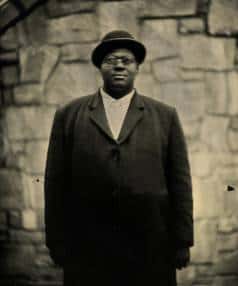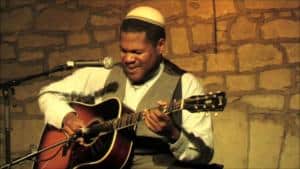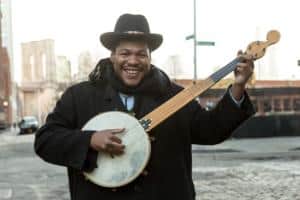The Return of Blind Boy Paxton: Interview
Jerron “Blind Boy” Paxton returns to New Zealand this month to open for Kitty, Daisy & Lewis at Auckland’s Powerstation on February 11th.
The American roots and blues musician will then headline five more shows throughout the country.
The 13th Floor’s Marty Duda spoke to Jerron recently to catch up on what he’s be up to since his last visit down under.
Click here to listen to the interview with Jerron “Blind Boy” Paxton:
Or, read a transcription of the interview here:
MD: I would say that a lot of people would consider the music that you do as very representative of the United States and the culture there. Are you representing something that’s current or something that’s past, or just something that you enjoy doing, and you don’t care what it represents to other people?
 JP: This isn’t the culture, en masse, that comes out through my music. It’s mostly music from the people of my culture – the people around Louisiana and Arkansas and Oklahoma, and all that. It’s usually the poor people – poor black people, poor Indians…poor French people – is what I’m descended from; and that’s the kind of music I play – that was the vehicle that goes into it. Most people abroad, and most people in the United States, who aren’t a part of that culture, don’t really understand it. I find a lot of people, who try to play the blues, emphasise some of the wrong things, because their missing some of the pertinent to the culture, to get the message across clearly – to represent the music as it is and as it was and what it’s turned into – and I do my best to bring that to people. My preferred way of doing that is on acoustic instruments. If I were to switch instruments to something more electronic – even the way people are doing it, now, on computers – it would come out different, but it would still be a representation of who I am and where I come from.
JP: This isn’t the culture, en masse, that comes out through my music. It’s mostly music from the people of my culture – the people around Louisiana and Arkansas and Oklahoma, and all that. It’s usually the poor people – poor black people, poor Indians…poor French people – is what I’m descended from; and that’s the kind of music I play – that was the vehicle that goes into it. Most people abroad, and most people in the United States, who aren’t a part of that culture, don’t really understand it. I find a lot of people, who try to play the blues, emphasise some of the wrong things, because their missing some of the pertinent to the culture, to get the message across clearly – to represent the music as it is and as it was and what it’s turned into – and I do my best to bring that to people. My preferred way of doing that is on acoustic instruments. If I were to switch instruments to something more electronic – even the way people are doing it, now, on computers – it would come out different, but it would still be a representation of who I am and where I come from.
MD: I was watching a couple of video clips of you playing – and your playing is rather extraordinary. I’m wondering how you got to the point of that virtuosity? Did you teach yourself? Did you have a lot of training?
JP: You practice your ass off! There’s no magic. There are no short cuts. There is… carcel application.
MD: But you have to start from someplace. I mean, if I was to pick up an instrument, I would be completely lost right from the beginning. Did you learn from watching other people, or listening to records? How did it get started?
JP: Well, like I said, this is the music of my people. You don’t have to get records to hear what your grandma sounds like. You just sit around and listen, and you pick up the sounds of your people, and all the ‘culuralisms’, and all that goes into making music, and making it beautiful, and making it representative of where it comes from. You pick that up from home – that’s where it is – so, certain things are part of you. Certain things you don’t have to seek them, they’re just present; you have to observe them.
MD: The songs, themselves, are things that – I assume – you’ve collected over the years as well. A song like Mole in the Ground, obviously, sounds, to me, like something that’s been around forever. Where do you come across them? Are they part of what you heard growing up, or do you go and seek them out?
JP: It depends. That song, in particular, is one of the songs you come across that’s part of the repertoire, and as you get to learn certain kinds of music, you get to learn a certain type of repertoire. Every kind of music has its own little canon, and a lot of the time, you draw from the canon. Sometimes you seek the esoteric music. It doesn’t matter how you do it, as long as you get it done.
MD: Is that a process that is ongoing? Like practicing your playing, do you still look for more songs to play?
JP: No. As of yet, I’ve got a pretty good repertoire; so, at this point, I’m trying to hone in what I already play, and make it as pretty as I can.
MD: Does that include changing the arrangements, or, when you say “honing it”, are you making minute changes, or are you culling songs? What’s that process like?
 JP: To make it better, you examine your repertoire, and you take out the things you don’t like, and you practice. That’s all it is: you practice, you make it better. Whatever the song needs to make it representative of you or what you want, that’s what you go after.
JP: To make it better, you examine your repertoire, and you take out the things you don’t like, and you practice. That’s all it is: you practice, you make it better. Whatever the song needs to make it representative of you or what you want, that’s what you go after.
MD: How important is the audience reaction to the songs? Does that have a lot of impact on what stays and what goes?
JP: Pretty much, that’s what you’re after, because your audience is who you’re trying to entertain. I play certain things to entertain myself and my close, personal friends, but you got to play what your audience wants. That is also balanced by being true to yourself, and going on the stage and saying, “This is what I want to play,” and you try to make it mutually beneficial – it’s a little from both sides – “This is something that I enjoy playing, that I think my audience will enjoy….”
MD: Do you have a particular idea of who that audience is? Is it fairly consistent, or does it change dramatically depending on what part of the country you’re in?
JP: It changes depending on situations. I’ve played all types of people and all types of situations.
MD: Is there one that you prefer over another? Do you prefer playing to younger people or older people, people overseas? Does it make any difference to you?
JP: Don’t make any difference. It does give me a lot of joy when I see young people come out; especially since I’m getting to the age where I’m actually seeing people younger than myself come out. It’s a small window, but the longer I live, the bigger the world gets… and it’s beautiful to see young people. I love playing for all sorts of people, but, you know, older people aren’t quite so interested in reinventing and picking up an instrument and starting from scratch – they’ve been on the path for a while, from their elders – but younger people: you never know quite how you can touch them, or how you can influence them, and part of you can go on in those young people. You could affect somebody’s lives, and affect somebody’s past that they take to the future.
MD: How would you say this music has affected your life, other than the fact that you make a living at it? Does it affect you in other ways?
JP: No more than natural….
MD: Do you see yourself playing this type of music twenty years from now, or do you see yourself moving on and trying other things?
JP: Like I say: this is the sound of my people; so, this is what I sound like, and this is kind of what I’ll always sound like, and this is what the people have always sounded like. It just changes based on what’s around it: we get more different kinds of instruments; we get more different kinds of influences. The music changes with them, but we still sound like ourselves.
MD: In your own listening: do you listen to much contemporary music, or do you concentrate on the type of music that you’re performing?
JP: I listen to anything that’s good.
MD: Do you have any particular favourites?
JP: Nope.
 MD: One thing that I noticed, when you performed here at the Tuning Fork for the first time… was that a big part of your show was what was going on between the songs: when you were tuning up, and you were talking to the audience and telling stories and telling jokes. How much of an effort do you have to make to work on that part of your show, and do you change that very often?
MD: One thing that I noticed, when you performed here at the Tuning Fork for the first time… was that a big part of your show was what was going on between the songs: when you were tuning up, and you were talking to the audience and telling stories and telling jokes. How much of an effort do you have to make to work on that part of your show, and do you change that very often?
JP: Not much. It don’t take too much of an effort. Honestly, it’s just being practical. People don’t want to sit around and hear you fool with a change for five minutes. I’m one of these people that, when I tune the guitar, I try to tune the hell out of it!
MD: Right! You’ll be surprised how many shows I go to where there is all this dead silence for three or four minutes in between each song, while the musician stares down at their tuning gizmo, and twiddles around with it forever; so, it does happen quite often.
JP: I might need to get me a tuning gizmo, because I don’t use them, hardly; so, I got to use my ears. Part of talking to the audience and tuning the instrument is actually to get in tune with the audience, and you get in tune with yourself; so, there’s no device to worry about. Part of the other thing is I don’t trust some of those devices either!
MD: I think they’ve… intruded upon the performance, because I find there are musicians that are constantly checking their tuning every couple of seconds, because they can; whereas, I remember back, maybe, thirty years ago, when I’d go to shows, that didn’t happen, and people managed to play all the way through without taking these long tuning breaks; whereas, now they’re doing it for every song. It breaks up the continuity of the performance. Have you found that at all?
JP: I don’t really have those problems; so, it don’t bother me!
MD: Very good. For folks who have seen you here, either last year or previously… what kind of show can we expect from you this time around? Do you change up the songs? Is it going to be, pretty much, what they’ve seen before? How would you explain it?
JP: I try not to play the same songs. There’s a balance that goes on. I try to play what people like. Sometimes people request certain songs again; so, the repertoire can’t be entirely new songs, but I like giving the people, who have seen me before, something new. I always ask who’s seen me before, and if the majority of the people haven’t seen me, I’ll just give them the ‘cream of the crop’ or whatever I feel like that day. There are too many variables that go into it. There’s a lot of freedom with being a solo musician: when you play with bands, you have to be tied to set lists and certain arrangements – with me, I can change everything every night – so, sometimes, even when I try to play the same thing every night, it doesn’t happen, because there’s a lot of freedom in it; there are a lot of brain cells that want to focus on certain things.
MD: … Have you ever played with other musicians? Have you thought about that at all?
JP: My first gig in New York was playing with a six piece band. I played in everything from trios, duos, eleven piece jazz orchestras to symphony orchestras.
MD: Ah, okay! So, you know what it is that you like to do… is to be be off on your own.
JP: Exactly!
Here are Blind Boy Paxton solo NZ dates:
February 12 – Totara St – Tauranga
February 13 – The Piano – Christchurch
February 15 – Theatre Royal – Nelson
February 16 – Old St Pauls – Wellington
February 17 – Black Barn – Hawkes Bay